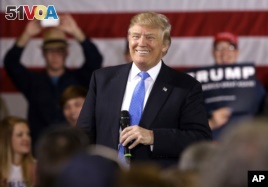March 30,2016
JANESVILLE, WISCONSIN— The campaign to collect more delegates on the road to the Republican nomination for U.S. president winds its way through the state of Wisconsin, home of Speaker of the House Paul Ryan. Republican presidential front-runner Donald Trump’s appeal to working-class voters is easy to see in the industrial town of Janesville, which is also Ryan’s hometown.
Standing in line among thousands hoping to see Donald Trump at the Janesville Conference Center was a last-minute decision for accountant William Collett.
The presidential candidate he’ll vote for in the Wisconsin primary April 5 also will be a late decision.

Republican presidential candidate Donald Trump smiles as he speaks at a campaign stop Tuesday, March 29, 2016.
“Well, as of this morning I’ll be voting for Trump,” said Collett.
One of the biggest reasons is Trump’s views on curbing foreign trade agreements.
“Look at the NAFTA program that was voted in by politicians," Collett said of the North American Free Trade Agreement, signed into law in 1993. "And they darn well knew that jobs were going to jump the borders.”
This is a primary concern for many in Janesville, home to a massive General Motors assembly plant that has been idle for almost a decade.
The plant's closure put thousands out of well-paying jobs and changed the lives of many in this working-class town of roughly 64,000, which reflects a large part of the Republican electorate.
“Many of them were once Democrats. Their fathers worked on the line in industrial America. They had a nice house in the suburbs. They make the kind of money the upper working class used to make in the '50s and '60s. They look back on that life and they wonder where it went,” said John Sharpless, a history professor at the University of Wisconsin in Madison.
Sharpless is a former Republican candidate for Congress who narrowly lost his election in 2000. He said Republican Party leadership has misjudged working-class voters for several election cycles.
“I think they are a hurting group, and they’re an angry group, and they feel rejected by the Democrats, and then they felt they were rejected by the Republicans, and Trump has tapped into that anger,” explained Sharpless.
Charlie Luiting, 21, said he’s most impressed by Trump’s credentials.
"He’s kind of the epitome of an American businessman. I kind of like that," said Luiting.
But there’s another name on Luiting’s radar: Ryan, who went to school with Luiting's mother. If Republicans are split among candidates and go to a brokered convention in July, there's speculation the House speaker could emerge as the party's nominee.
"If Paul was in the race, I would vote for Paul just because of my personal connection with him. I trust him. He’s honest. Straightforward," Luiting said.
Sharpless said Ryan could be a strong contender as the Repblican nominee: "If he somehow magically became the candidate, I think he’d be a very serious rival for Hillary Clinton.”
Ryan, who served as running mate to the GOP's 2012 nominee, Mitt Romney, has said he believes the nominee should be someone currently in the race.